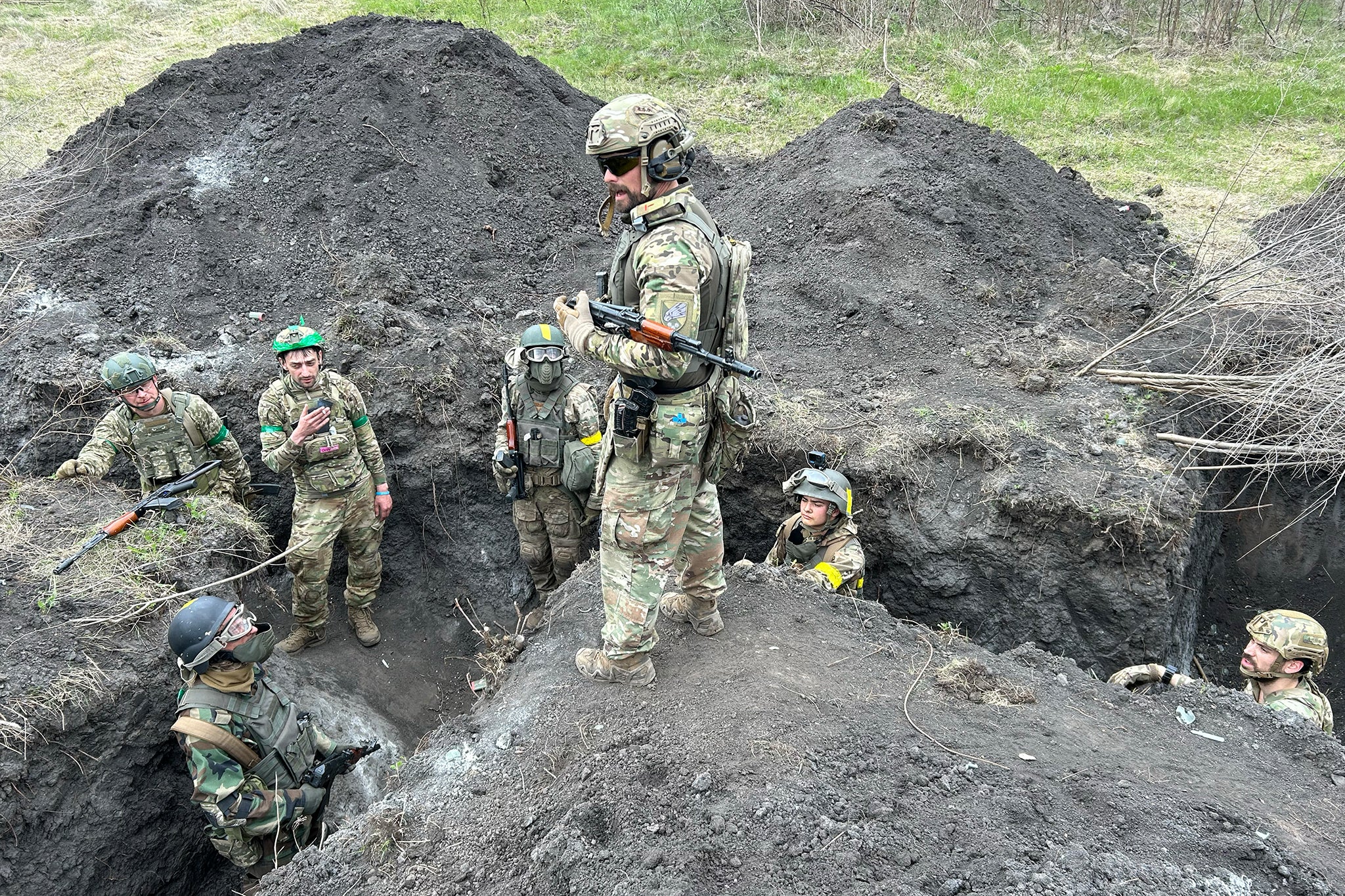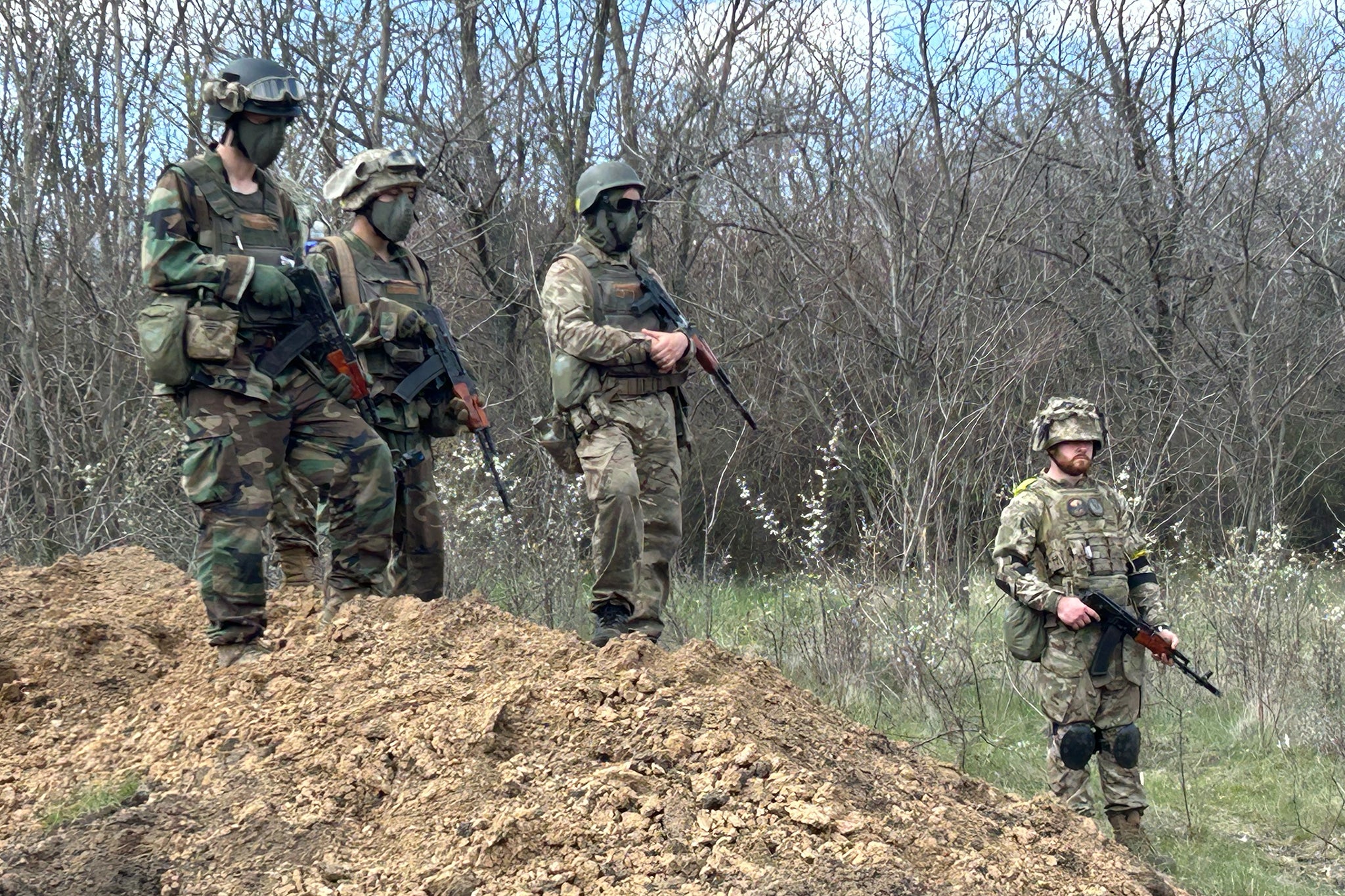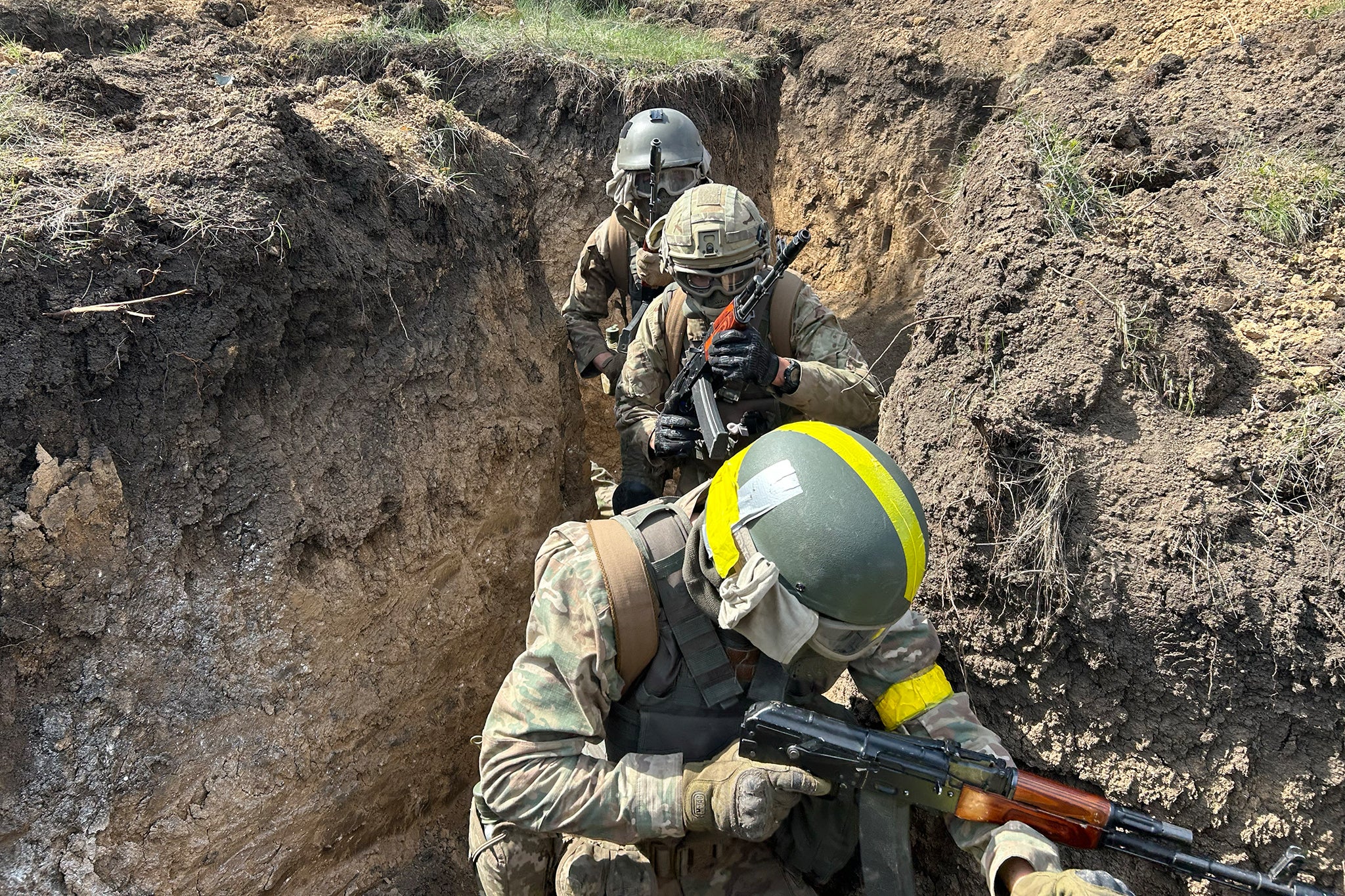ARTICLE AD BOX
On a mild spring evening, deep in eastern Ukraine, Shawn McVey – call sign “Goldfish” – peers into a gully where controlled chaos is unfolding. “If you’re too busy killing, you don’t have time to die,” he bellows across the smoke-filled twilight.
Explosions punctuate the dusk, casting brief, searing flashes over a network of trenches carved deep into Ukrainian soil. Helmets bob through the haze; figures crawl and scramble under fire, their shouts blending with the staccato of simulated gunfire.
“Your job isn’t to die for Ukraine – it’s to make sure they die for Russia,” roars Brad, call sign ‘Cossack’, a grizzled 20-year veteran of the US 82nd Airborne and the camp’s head instructor.
Amid the mayhem, a handful of Western voices rise over the chaos. This unlikely patch of rural Donetsk in eastern Ukraine has become a hub for an influx of foreigners signing up to fight against Russia – a growing phenomenon that Ukrainian commanders and a cadre of Western veterans are now working to shape into a disciplined force.
The training course – a three-week selection process masterminded by McVey – was created after Ukraine’s 25th Airborne Brigade, currently defending the critical city of Pokrovsk, found themselves overwhelmed by the influx of foreign volunteers.
Many found their way here via a single Reddit post.

“I reached out to the 25th Airborne Brigade and got a phone interview, a background check – then I was told I could come,” says Scott, 19, call sign “Buffalo”, a firefighter from Washington State.
If they make it through, many hope to specialise as drone pilots – a critical and rapidly evolving role on Ukraine’s battlefield.
In a war increasingly dominated by drones, gaming skills have become a surprisingly valuable asset.
“Foreigners tend to have a lot of gaming experience – and we need that,” says Oleg Grabovyy the course co-ordinator, call sign “Hazard”. “The dexterity you get with an Xbox controller is directly transferable to flying drones. The best FPV [first-person view] pilot I ever met was a relentless gamer.”
Drone warfare has levelled the playing field for Ukraine against Russia’s superior artillery. A $200 drone can destroy equipment worth hundreds of thousands, even millions. Kyiv now plans to produce over 5 million drones in the coming year alone.
Sam, call sign “Bambi”, is 20 years old and an avid gamer who recently arrived from Charleston, Georgia. He started in simulations, has now competed in drone-racing tournaments across the US and says his background is finally being put to use.

“Competing, you fly through 5ft gates at 100mph, making tight turns. It’s all about precision and reflexes. I’m planning to use everything I’ve learned to help Ukraine.”
“We’ve got a little bit of everything here from the English-speaking world,” says McVey, 33, a muscular former soldier in the US Army’s 25th Infantry Division. Tasked with creating the foreign fighters’ training programme, McVey oversees a mix of Americans, Canadians, Brits, Australians – even a few English-speaking Frenchmen and Ukrainians.
The recent surge in foreign volunteers coincides with a cooling of US support for Ukraine under the current administration.
“At the outbreak of the war, a lot of people came,” says Grabovyy. “But over the last two years, it really slowed down. Now, in the past couple of months, it’s spiked again.”
Grabovyy, a US citizen of Ukrainian heritage, left his business in Syracuse, New York, to join the Ukrainian army following Russia’s full-scale invasion in March 2022. “You’d be surprised how many are coming – hundreds and hundreds from all over the world. We're getting a lot of young Americans, 18, 19, 20 years old. They think their government has abandoned Ukraine.”
As night falls, one of the newest recruits, Alex, 25 – call sign “Giggles” – clambers out of the trenches, caked in mud. A social worker and medic from Toronto, he arrived three weeks ago.
“I wasn’t brave enough to come for the last two years,” he admits. “But with the political situation in the US, it pushed me over the edge. My family thinks I’m crazy – but they’re supportive. I want to help, and this is where I feel I belong.”

It's a sentiment echoed by many in this intake. “Bambi” dropped out of college to join the fight: “I supported Ukraine from the beginning. I was disheartened by what I saw happening in the White House. If one person steps back, others have to step forward. I sat with the idea of coming for a month to be sure it wasn’t just a fleeting feeling.”
Those who pass move on to a six-week basic training course before specialising. McVey emphasises the importance of mixing Ukrainian and English-speaking recruits so they can learn from each other.
“They needed help sorting the serious from the fantasists and war tourists,” he explains. “We give people the honest truth. If they're not cut out for it, they’re out. We reject about 30 to 50 per cent.”
What is most striking about these recruits is their youth – most are barely out of their teens, with little or no military experience. Yet, they share an idealism and urgency, much of it sparked by a perceived collapse in American support for Ukraine.
Scott, too, dreams of the drone corps: “I volunteered in an FPV drone factory here for a month before coming here. If you’re good at flight simulators or helicopter games, you’ll do well flying drones in combat.”
Alex hopes to operate observation drones or even deliver medical supplies to the front lines via drone.

Garreth, call sign “Dragon”, a former royal engineer, left his job as an NHS critical care worker in Wales. “I have an electronic engineering degree and the FPV electronic thing is what drew me here. I can combine my sapper experience and electronic engineering skills; it’s an interesting time in warfare and I’m a gamer.”
Across the board, the recruits say they’ve been impressed by the calibre of the training and the instructors.
“I came with low expectations – but the training has been amazing,” says Scott.
“Everyone back home told me they’d just throw me in a trench and leave me to die,” adds Alex. “Instead, the instructors and recruits have inspired me. These are my brothers now.”
Despite the risks, the young fighters are calm about what lies ahead.
“I don’t think about dying,” Scott says, shrugging. “If it happens, it happens. We’re all going to die sometime — it might as well be for a good cause.”
Bambi nods. “My mum and dad aren’t thrilled, but they understand. I’ve decided to stay until victory or death — whichever comes first.”









 English (US) ·
English (US) ·